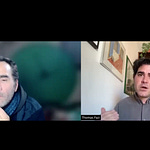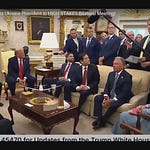The United States can no longer be considered a reliable ally. In its efforts to broker peace in Ukraine, it has acted in a treasonous manner that undermines our interests. Jacques Attali, a former key adviser to François Mitterand and Parisian king maker (he was one Emmanuel Macron’s mentor) in what appears to be a paranoid outburst, has gone so far as to suggest that Donald Trump is emulating Adolf Hitler—a claim that reflects a heightened state of panic.
We Europeans are reacting with undue indignation, akin to spoiled brats, to Donald Trump’s intent—backed by the mandate of his electorate—to expeditiously resolve the conflict between Russia and Ukraine. This war involves nations that holds neither NATO nor European Union membership. Our sole strategic interest laid in 2022 in preventing this war’s outbreak, and it lays now in seeing it concluded with the utmost urgency.
The ingrained shortcomings of Europe’s leaders alone do not fully account for their tenacious adherence to a narrative that, from its inception, has been built on falsehoods. This stance is driven by a broader challenge, led by the Trump administration and the Republican Party, of a deeply entrenched and generously resourced transatlantic power superstrucuture. Absent this superstructure, many of Europe’s current leaders would find themselves stripped of influence and power. The era of carefully "managed" democracy has reached its end. Certain factions remain unwilling to acknowledge this reality.
Freedom of expression, a bedrock principle of American society, holds such weight that it now serves as a central axis for both U.S. domestic and foreign policy. This emphasis has fueled a reassessment of the Atlantic partnership and provided the rationale for escalating trade tensions across the alliance. It also justifies a possible trade war.
It may be an opportune moment for us to shift our focus away from the strident and unproductive clamor of television commentators and politicians, whose primary influence appears limited to exacerbating the difficulties faced by their fellow citizens.
The time seems ripe to earnestly engage with and comprehend the perspectives conveyed by our American chums, setting aside our tendency to adopt a prescriptive tone. Friendship, after all, does not imply unconditional acquiescence.
These matters are explored in conversation with Michael Shellenberger, a journalist and scholar who serves as the CBR Chair in Political Science, Censorship and Free Speech at the University of Austin, Texas. Initially renowned for his expertise in environmental and energy policy, Shellenberger gained prominence, together with Matt Taibbi, for exposing the Twitter Files. He also holds the position of president at Civilization Works.
L'Eclaireur: Michael Schoenberger, thank you so much for taking the time to speak with me. Let's rumble and go straight down to the hard and brutal stuff. What is it with European leaders' incapacity to understand America? And please feel free to take off the gloves.
Michael Shellenberger: Well, first, thank you so much for asking to speak with me. I think it's an important time for there to be honest conversations between Americans and Europeans. It is indeed. I guess the way I would summarize the relationship is that it's like an old marriage in that there's been some festering resentments that haven't been talked about. I think that both sides have expressed some amount of frustration and even anger at the other while recognizing that we do have an important relationship.
We've been seeing, particularly from Macron, a recognition that the security relationship between the United States and Europe is changing and that France is the leader, not Germany, when it comes to security because you have a nuclear deterrent. That has been positive. At the same time, I think the reaction to the meeting at the White House between Zelensky and Trump and Vance showed that Europeans don't understand how tired America is of playing police officer to the world and that we are very serious about wanting to end the conflict in Ukraine.
Nobody enjoys having people in their life behave in an entitled way, and the way Zelensky behaved, his attitude struck many of us, regardless of our opinions of Trump. I think European leaders recognize that Americans are seeking a different military security relationship. The Zelensky meeting happened, and it felt as though both Zelensky and many European leaders, who very quickly posted on X that they agree with Zelensky and by implication disagree with Trump and Vance, showed a lack of understanding and a sense of entitlement that is not warranted.














